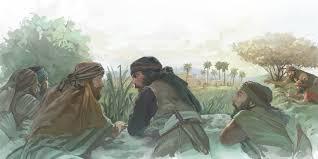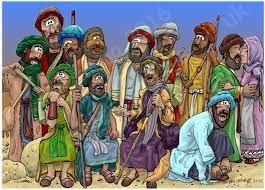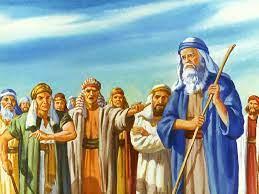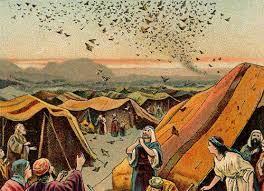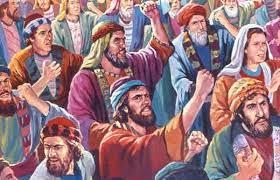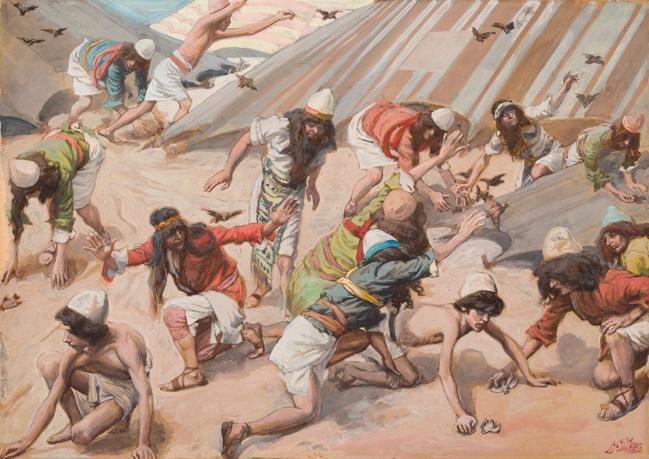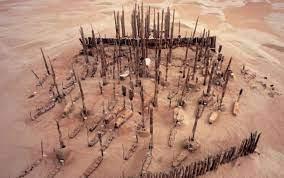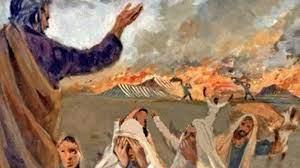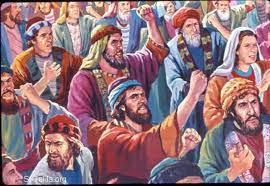By – The Report of the Spies 13: 26-33
The Report of the Spies
13: 26-33
The report of the spies DIG: What kind of report do you think the people were expecting? What is the significance of the word “however” at the beginning of 13:28? How did Caleb attempt to silence the people? With their history of victories (Exodus Ch 7- 15), why and how do you think Isra’el should have been able to overcome the giants?
REFLECT: Does the promise of God come without struggle? What are some of the obstacles you had to overcome to see the promise of God fulfilled in your life? Have you ever trusted human wisdom and experience more than God’s promises? How does ministry suffer when it is based on human wisdom? Ask God to give you Caleb’s perspective.
And the unfaithful ten spread an evil lie about the Land they had spied out.
According to the Torah, the wilderness wanderings were marked by two egregious sins; the apostasy of the golden calf (Exodus Chapters 32-34) and the faithlessness of the spies (Numbers Chapters 13-14). Only these two sins are singled out for special mention in the survey of the wilderness journey given by Deut 1:19-45 and 9:1-24; and only in connection with these two sins does God threaten the annihilation of Isra’el and the fulfillment of the patriarchal promise through Moshe (Exodus 32:10; Numbers 14:12).236
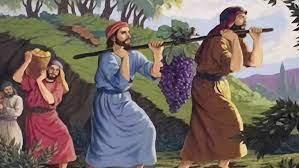
Forty days later, they returned from spying out the Land and immediately went to Moshe, Aaron and the entire community of the people of Isra’el at Kadesh-barnea in the Pa’ran Desert, where they brought back word to them and to the entire community and showed them the fruit of the Land (13:26). The sages teach that this took place on the Ninth of Av (see the commentary on The Life of Christ, to see link click Mt – The Destruction of Jerusalem and the Temple on Tisha B’Av in 70 AD).What they told Moses was this: “We entered the Land where you sent us, and indeed it does flow with milk (good for grazing) and honey (good for agriculture) – here is its fruit, the grapes, the pomegranates and the figs (13:27)!
Nevertheless (Hebrew: ephes), this term denotes human impossibility. This one word revealed their unpardonable offense. Had they simply said that the people of Canaan were mighty and the cities fortified, they would merely have stated a fact and thus discharged their duty. But in that one word, ephes and in describing the mighty people guarding the frontiers, they gave their own verdict that it was beyond Isra’el’s power to conquer the Land.
Nevertheless, the people living in the Land are fierce, and the cities are fortified and very large. Moreover, we saw the giant descendants of Anak there (13:28). We can’t attack those people, because they are stronger than we are (13:31). They were notoriously large warriors, and according to later biblical accounts, remnants of those giants remained west of Canaan in the Philistine regions of Gaza, Gath, and Ashdod (Joshua 11:21-22). Four of those giants were killed by David’s men (see the commentary on the Life of David Eg – David’s Heroes), and the great giant Goliath of Gath was slain by the young warrior David with a slingshot (see the Life of David Al – David Kills Goliath)
The Amalekites live in the area of the Negev; the Canaanite Hittites, the Jebusites and the Amorites live in the hills; and the Canaanites live along the Mediterranean coastal plain and the Jordan Valley (13:29). The Canaanites were the indigenous population of Canaan. The Amorites had entered Canaan from northeast Aram (Syria) sometime before 2000 BC, had driven the Canaanites out of the hill country, and taken their place there. The Hittites originated in central Anatolia (modern Turkey) about 1800 BC and slowly spread south and southeast, probably identifying with the Amorites in Canaan. Nothing is known of the Jebusites except that they were centralized in Jerusalem. They remained in control of Jerusalem until 400 years after Moses, when David drove them out, capturing the City, and making it his capital in 1003 BC (see the Life of David Co – David Conquers Yerushalayim).237
The sight of the Amalekites did not dishearten Caleb and Joshua at all. Caleb silenced (Hebrew: vaiyahas, an imperfect verb) the people toward Moshe. This imperfect verb tells us two things. First, the spies’ report that was given to Moses was also in earshot of the people. It was negative enough to cause a verbal stir among them. Second, it tells us that the report evoked such a strong response that Caleb had to continually attempt to keep them quiet enough for him to speak. Interestingly enough, it says that Caleb had to silence the people “toward Moshe.” This indicates that already there was another rebellion brewing among the people.238
The suspense builds. Will the Israelites be encouraged by the reports and evidence of the Land’s fertility? Will the good news about the Land overcome their fears about the great size and strength of the enemy in Canaan? There was apparently some muttering among the Israelites until Caleb quieted the people and said: We ought to go up immediately and take possession of it; there is no question that we can conquer it (13:30).239 Though Caleb and Joshua saw the same things that the other ten spies had seen, their assessment of the situation was completely different. They looked at the Amalekites and the Canaanites through the eyes of faith.
There is a difference between a blind faith and a seeing faith. Blind faith is uninterested in the data. “Don’t confuse me with the facts.” A seeing faith sees the real world with all of its problems, but it interprets that world in steadfast confidence. It is an unquenchable spirit of optimism, a confidence in God’s ability to utterly transcend each and every obstacle. In the end, the dreaded Amalekites fell before Joshua and Caleb. At that time Joshua went and destroyed the Anakites from the hill country: from Hebron, Debir and Anab, from all the hill country of Judah, and from all the hill country of Isra’el. Joshua totally destroyed them and their towns. No Anakites were left in Israelite territory; only in Gaza, Gath and Ashdod did any survive (Joshua 11:21-22).
The city of Hebron was inherited by Caleb. Moshe declared: Caleb, the son of Jephunneh; he shall see it, and to him and to his sons I will give the land on which he has set foot, because he has followed ADONAI faithfully (Deuteronomy 1:36). Hebron was the first place in the Land that his foot had stepped (see Bx – Spying Out the Land). The very city which had so frightened the other ten spies on their entry into the Promised Land came to be his own possession. So, Joshua blessed Caleb and gave him Hebron as his inheritance. Therefore, Hebron has belonged to Caleb ever since, because he followed ADONAI, the God of Isra’el, wholeheartedly. Hebron used to be called Kiriath Arba after Arba, who was the greatest man among the Anakites (Joshua 14:13-15). The dreaded Anakites came to nothing.240
Caleb tried to encourage the people to go into the Land. But the balance tipped when all the spies except for Joshua and Caleb, lied about both the Land and its inhabitants, making them seem like primordial monsters. Bypassing Moshe and Aaron, they spread an evil (Hebrew: dibbat, this term contains within it the idea of negativity, falsehood, and strife) and lied about the land they had spied out for the people of Isra’el. When Numbers 14:27 adds the word evil (Hebrew: ra, meaning bad, evil): How long am I to put up with this evil community who keep grumbling about Me? it merely clarifies what is already implicit. Their report was, then, false and negative – designed to produce strife. This means that the whole intent of the spies from the start was to present a negative picture and a false report to the people of Isra’el. The content of their report shows that they were using exaggeration to sway the people. It was no longer a land flowing with milk and honey, but a land that devoured its inhabitants. A lie. All the people we saw there were giants. A lie (13:32)!241
We saw the Nephilim (see the commentary on Genesis Ca – The Sons of God Married the Daughters of Men), the descendants of Anak, who made us look like small grasshoppers by comparison, and we looked that way to them too (13:33)! A lie. The Nephilim, who were destroyed by the Flood, were so named because they caused those who saw them to fall down (Hebrew: nafal) in fear for their lives. There were descendants of Anak there, but there were no Nephilim there. It was just something they threw in to bolster their case.242They even stooped so low as to use their children as an excuse not to go in, saying that they would be taken from them as booty (Numbers 14:3 and Deuteronomy 1:39).
The evil report prevailed. And in doing so, they renounced God’s promise to accompany them with His awesome Presence, to grant them decisive victory in what seemed, humanly speaking, to be overwhelming odds, and therefore, to give them their rightful inheritance as the people of God – a homeland of abundant prosperity. But the full possession of the Promised Land in freedom was, and always will be, dependent upon the people’s faithfulness.243
To an unbelieving world, it’s unreasonable for anybody to trust a God they’ve never seen or heard, but we have all the evidence we need to convince us that ADONAI is dependable and has the power to accomplish what He says He will do. What He promises. He is able to perform, being fully persuaded that God had power to do what he had promised (Romans 4:21). Isra’el had seen what YHVH did to the Egyptians and to the Amalekites (see the commentary on Exodus Cv – The Amalekites Attacked the Israelites at Rephidim), and they had every assurance that He would never fail His people.
Unbelief is serious because it challenges the character of ADONAI and rebels against the will of God. But without faith it is impossible to please God (Hebrews 11:6). For whatever is not of faith is sin (Romans 14:23). Moses reminded the people of what God had already done for them (Deuteronomy 1:29-33), but they wouldn’t stop complaining. They were sure that the best thing to do was return to Egypt and go back into bondage.244



